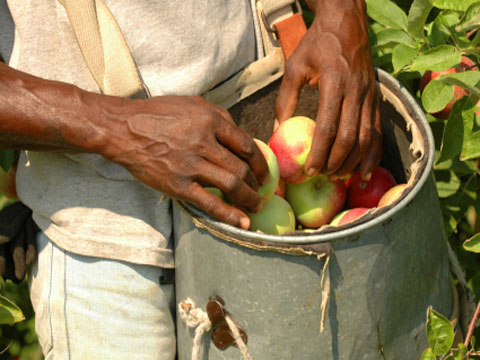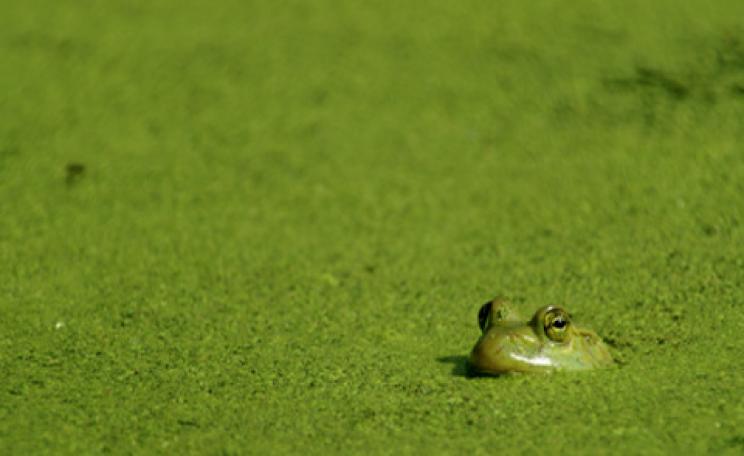The 15M movement, born in Madrid after a major demonstration against Spain’s economic crisis earlier this year, moved away from the city and set up a camp to oppose the destructive practices generated by open pit coal mining as part of its 'Take the mountain!' initiative. The Ecologist visited their protest camp to witness an increasingly bitter conflict.
A few meters away from the camp the police welcomed the activists, shotguns in hand, searched they're belongings, and asked for identification. They followed the same intimidating procedure for the hundreds of people that poured in from all corners of Spain to try and stop the devastation of the beautiful Laciana valley in the Spanish north-eastern province of Leon. Home to endangered species such as the brown bear, by coal open cast mining.
If you walk a few hours north of the camp, the majestic mountain scenery changes radically into a moon-like setting. 'It’s like the Kingdom of Mordor in the movie Lord of The Rings,' some locals have commented. In this case, the one to rule them all is the coal bigwig Victorino Alonso (or Father Don Vito, as he has been named by campers). He is owner of the two main Spanish mining businesses, CMC and UMINSA.
This year his businesses received 134 million Euros in coal subsidies from the Spanish government to promote native coal, according to the Spanish Ministry of Industry. With this money Victorino is planning to expand open-pit mines to the adjacent mountains, but it’s a no win situation. The European Union has ruled that all subsidises for deficient coal mines will have to cease by 2018. That includes all Spanish mines.
'Spanish coal is no longer economically viable. The coal from this area has little heating power and a high percentage of water, so it is mixed with stones or with coal from abroad,' explained an ex-miner.
Last year the Court of Justice of the European Union presented a report which proved that mines in Laciana were damaging the environment and breaking European laws. The European Commission is accusing the Spanish government of allowing the Junta of Castilla y Leon to give the green light for mining activities in Laciana, a protected area.
Unique ecosystem
At night our only source of light were the thousand of stars which watched upon the valley. Only the communications tent had electricity, which was given by a neighbour whilst campers worked on a solar panel which would act as a substitute.
The valley of Laciana is a unique ecosystem, one of the last resorts where brown bears and grouse live, both of them in danger of extinction. It is also a protected area inside Red Natura 2000 and SPAs (Special Protection Areas) and qualified as a Biosphere Reserve recognized under the UNESCO.
Expansion plans for open pit mines in the valley would occupy the equivalent to approximately 2000 football fields. However mining companies claim that there is nothing to worry about, because after a mine is used the area is replanted and brought back to normal and may even 'look even better than before', as Victorino apparantly claimed in Spanish TV program La Sexta.
José Francisco Fernández Gatón, is an ex-miner who is now head of Filón verde, a platform born 7 years ago to fight open pit mining in the area. He said that 'it is impossible to reconstruct these mountains.' The soil, which took millions of years to form, is now weak and whatever is planted tends to be washed away downhill.
Moreover, aside from the actual mining area, all the earth, rubble and stones which are removed are stored up in huge dump sites, which can occupy the whole mountain, burying forests and creating cracks in the mountains due to the heavy weight. To extract one ton of coal, 40 tonnes of earth need to be removed. To make matters worse, the machines employed use up 7000 litres of gasoil per day.
Nobody from the village drinks from the tap. The underground flow of the aquifers which run through and by the side of the mines converge in the river Sil, where the population is supposed to drink from. 'There is a sewage treatment plant, but we don't think it can purify water which could carry poisonous metals. We rather not drink it, says a woman from the nearby village of Sosas.
Targeting dissent
We all cringed at what ex-miner Calasio was saying during one of the first assemblies at the camp. One of his horses had been attacked with an axe, dying shortly after, and another one had been graffitied all over his loin with the message ‘son of a bitch’. Calasio, like many others, claims he was targeted after highlighting the ecological destruction of the valley.
Traditional sub-surface miners are now losing their jobs because underground mines are being shut down to make way for open pit mines, which need less workers as they rely on heavy machinery, activists claim.
The Ecologist has learnt that of a population of around 11,000 people who live in Laciana, in 2009 only 238 people worked at the open pit mines (today the figure is even less). This means that open pit mining is benefiting only 2 per cent of the population of Laciana, who are paying the price of seeing their mountains being destroyed.
Despite all this, some villagers have a different opinion. On the third day after activists' arrival an agitated group of people advanced against the camp holding up banners urging us to leave. 'You will not take our jobs away!' they shouted. A line of police held the angry crowd away from the protestors.
These were open-pit miners, youths and families who were wondering about the possible solutions and alternatives to mining. 'You cannot tell a man who has been working all his life in the mine to make lavender smelling soap and start selling it,' one of them said.
What next?
Contrary to what the younger generation of Laciana percieved, mining in the valley begun in 1920. Up until then, the valley had subsisted on agriculture and farming. Moreover, several projects begun in the area to provide alternative job offers, but they have been stopped. For instance, in 2004 it was announced that Laciana would enjoy a Tourist Inn in Villablino, but locals claim nothing has been done.
In addition, the area is benefiting from Europe's MINER plans, which are subsidies given to create infrastructures, give scholarships and finance projects to create new jobs in areas which have been affected by mining. 'Where is all the money going?' ask those who live in Laciana.
This year Spanish coal supplied just 12.9 per cent of the total electricity for the country, according to Red Electrica de España, the Spanish corporation in charge of operating the nation's electric grid. The figures are getting smaller every year whilst, according to the environmental organisation Greenpeace, coal is the most polluting way to generate electricity, responsible for 70 per cent of the CO2 emissions from the power sector worldwide.
The 15M campers are promoting a change of lifestyle non dependant on fossil fuels, but face many problems involving the local authorities, miners, the government and mining businesses. It's a hard battle to fight in this remote corner of the country.
| READ MORE... | |
 |
HOW TO MAKE A DIFFERENCE Activists square up to coal mine threatening 'Lord of the Rings' site Sarah Bentley reports from the activist camp standing in the way of an open cast coal mine in Shropshire in an area said to have inspired Tolkien's Middle Earth |
 |
NEWS ANALYSIS Freedom food: the organic farmers who took on the Italian mafia Would you work on confiscated lands owned by mafia bosses who have killed countless people? The Ecologist reports from Italy on the new farming cooperative turning a bloody past into organic olive oil, oranges and wine |
 |
NEWS Toxic waste from Burma's largest coal project could displace 12,000 Despite wreaking havoc on the health of local villagers and the environment, Burma's military regime is doing nothing to reduce the impact of the Tigyit power plant and mine |
 |
INVESTIGATION The new coal age The coal industry of last century is the prime reason Merthyr Tydfil has the worst health in the UK. Now, with more coal and cash to carve from one of Europe’s largest opencast mines, developers and the local authority are back to finish the job. Words and photographs by Amy Scaife |
 |
NEWS ANALYSIS Bitter harvest: migrant workers on UK farms 'still exploited' Migrant workers are vital for meeting the UK's demand for year-round fruit and vegetables. But despite improvements since the Morecambe Bay tragedy, allegations of poor conditions and abuse in the horticulture sector persist. Andrew Wasley reports |







